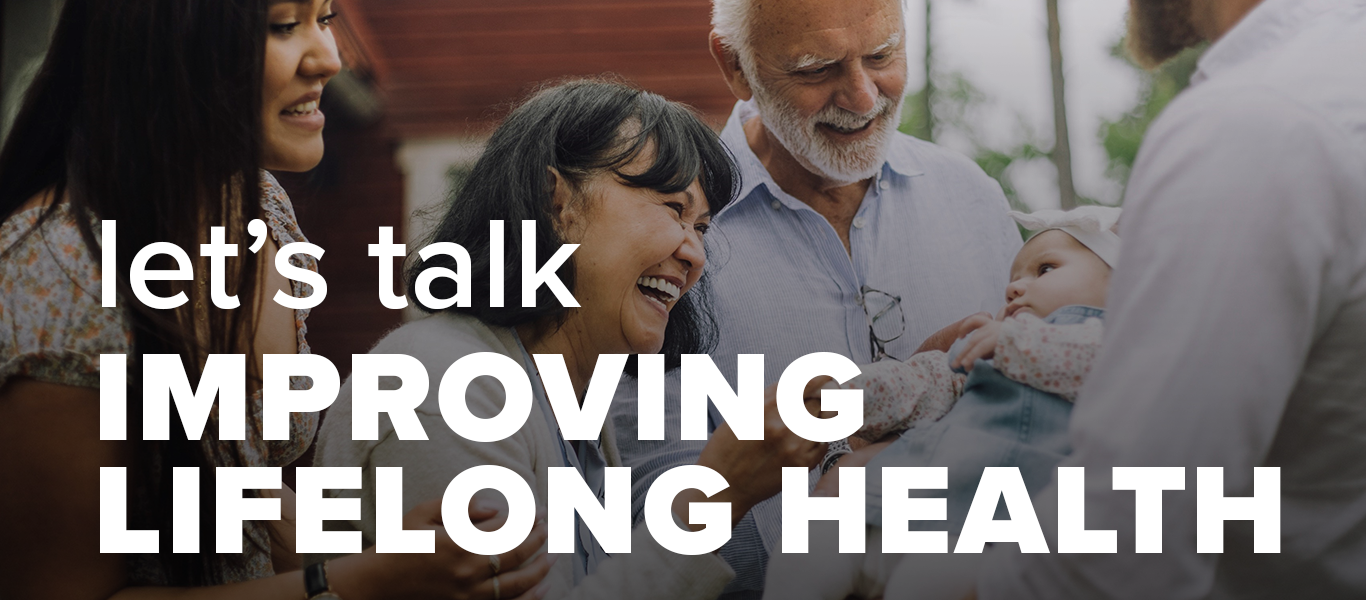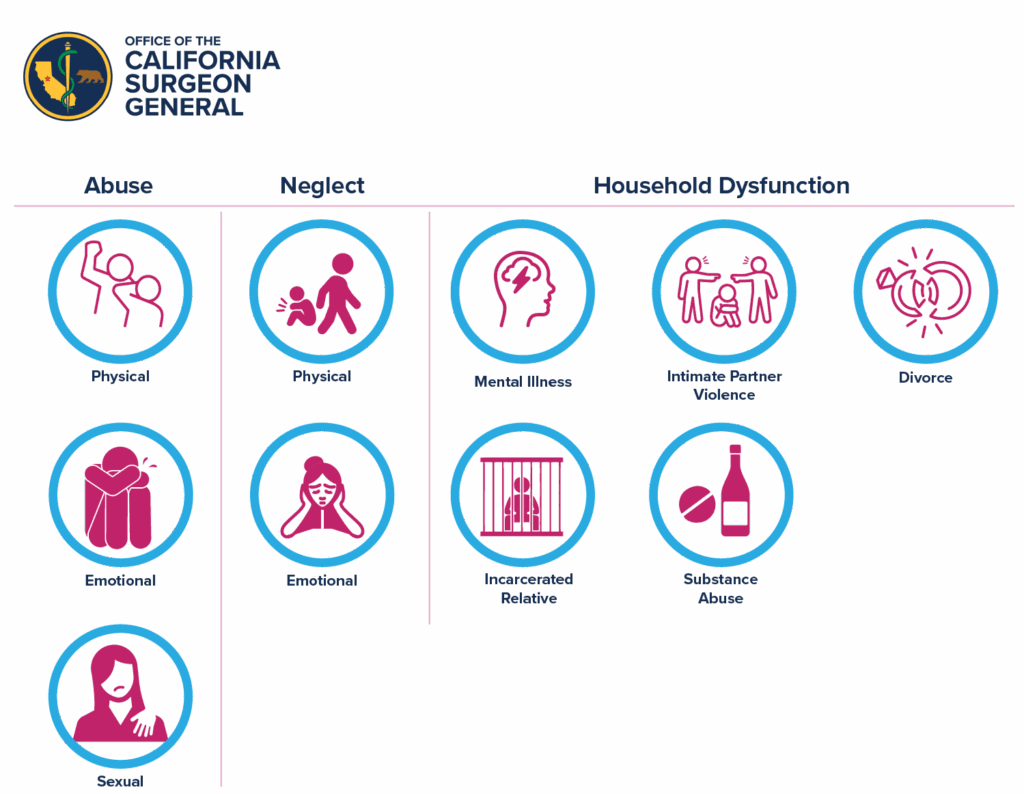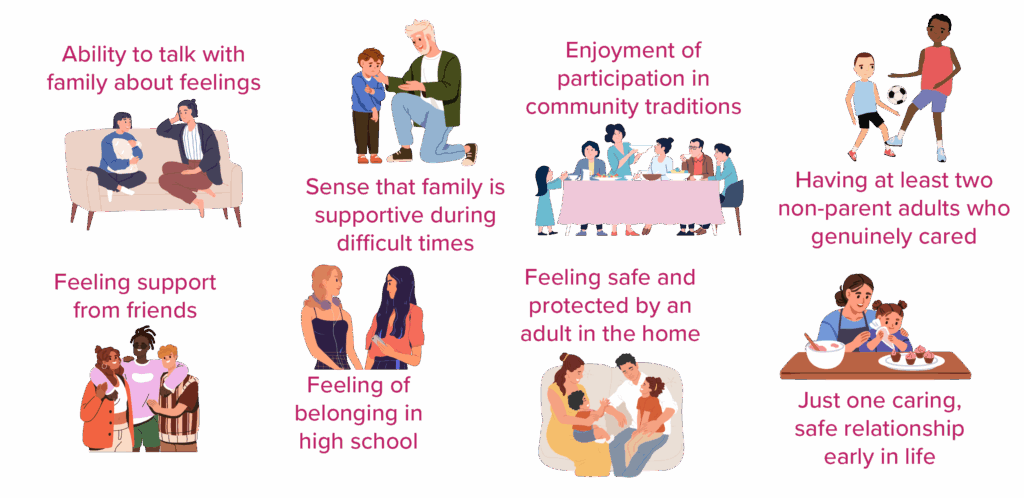
Adverse Childhood Experiences (ACEs) are stressful or traumatic events in childhood—like abuse, neglect, or household challenges. These experiences have profound impacts—but they are reversible. Supporting individuals during this time can improve health, strengthen family stability, and lay the foundation for healthier communities.
First Section
First Section
What are ACEs?
An overwhelming scientific consensus demonstrates that cumulative adversity, particularly during critical and sensitive developmental periods, is a root cause to some of the most harmful, persistent and expensive health challenges facing our nation. The term Adverse Childhood Experiences or “ACEs” comes from the landmark study of the same name published by the CDC and Kaiser Permanente over two decades ago and specifically refers to the ten categories of stressful or traumatic events assessed in the study. These include physical, emotional or sexual abuse, physical or emotional neglect or “household dysfunction” including parental incarceration, mental illness, substance dependence, parental separation or divorce, or intimate partner violence. A robust body of literature demonstrates that ACEs are highly prevalent, strongly associated with poor childhood and adult health, mental health, behavioral and social outcomes and demonstrate a pattern of high rates of intergenerational transmission.

What is Toxic Stress?
When any one of us experiences something scary or threatening, our brains and bodies activate our stress response which leads to the production of high levels of stress hormones including adrenaline and cortisol and is responsible for many of the feelings we associate with being terrified. The amygdala, the brain’s fear center, is activated and the prefrontal cortex, which is responsible for executive functioning including attention, judgment and impulse control, is inhibited. Stress hormones stimulate our hearts to beat stronger and faster, raise blood pressure and blood sugar, and activate our immune system, among many other effects. The stress response is a normal and, in fact, essential part of our biological evolution, and allows us to respond and adapt to challenging circumstances.
However, severe, intense or prolonged adversity may lead to overactivity of a child’s stress response. In addition, children require the nurturing care of a trusted adult and safe environments to shut off the stress response and restore normal functioning. Without these buffers, the biological stress response becomes overactive. Children are uniquely vulnerable to the effects an overactive stress response because their brains and bodies are just developing. High levels of adversity, without the buffering protections of trusted caregivers and safe, stable environments, lead to changes in brain structure and function, how genes are read, functioning of the immune and inflammatory systems, and growth and development. These changes comprise what is now known as the toxic stress response.
How common are ACEs?
ACEs and toxic stress represent an urgent public health crisis with wide-reaching health and societal impacts, from heart disease to homelessness.1-5 According to recent data, 62.3% of California adults have experienced at least one ACE, and 16.3% have experienced four or more ACEs (2011–2017 data).
How to manage stress?
ACEs and toxic stress can have long-lasting effects on our bodies and brains. The good news is there are proven things we can do in the moment to ease our response to stress, and longer-term solutions — like mental health support or treatment from a primary care provider — to help us in our journey to healing.
What are Positive Childhood Experiences (PCEs)?
Positive Childhood Experiences (PCEs) are the everyday moments and relationships that help children feel connected, supported, and safe. Simple, ongoing actions—like talking openly with family, joining in community traditions, or feeling supported by friends—can have lasting benefits for mental health and social-emotional well-being well into adulthood.
Research shows that PCEs not only strengthen healthy development but also buffer against some of the
negative effects of ACEs, including stress and poor health outcomes. At their core, PCEs are built on four key foundations: caring and supportive relationships, opportunities for connection and belonging, safe and equitable environments, and learning the skills to understand and manage emotions.

What are the societal impacts of ACEs?
ACEs are strongly associated, in a dose–response fashion, with some of the most common and serious health and social conditions facing our society, including nine of the 10 leading causes of death in the United States, and with earlier mortality. In addition, ACEs are associated with our most pressing social problems, including learning, developmental, and behavior problems, high school noncompletion, unemployment, poverty, homelessness, and felony charges.
What are the costs associated with ACEs?
A recent estimate based on 2013 expenditures revealed that ACEs cost California $112.5 billion overall annually ($10.5 billion in personal healthcare spending and $102 billion in years of productive life lost), and will cost over $1.2 trillion in the next 10 years. The high prevalence of ACEs in California, along with the intergenerational accumulation of impacts for individuals, families, and communities, have resulted in a public health crisis, with the greatest impacts on already disadvantaged individuals and communities. The time to act on this crisis is now.
Live Beyond ACEs
ACEs and toxic stress can profoundly affect our health, relationships, and well-being, but the good news is that with awareness and support, we can take steps to recover and build resilience for ourselves and future generations. The Live Beyond campaign offers the tools, resources, and inspiration to help Californians move forward and live a healthier life.
ACEs Aware Initiative
The Office of the California Surgeon General and the Department of Health Care Services (DHCS) are leading a first-in-the-nation statewide effort to screen children and adults for Adverse Childhood Experiences (ACEs) in primary care, and to treat the impacts of toxic stress with trauma-informed care. The ACEs Aware initiative, implemented by the UCLA/UCSF ACEs Aware Family Resilience Network (UCAAN) is built on the consensus of scientific evidence demonstrating that early detection and evidence-based intervention improve outcomes.
Roadmap for Resilience:
California Surgeon General’s Report
Serves as a blueprint for how communities, states, and nations can recognize and effectively address Adverse Childhood Experiences (ACEs) and toxic stress as a root cause to some of the most harmful, persistent, and expensive societal and health challenges facing our world today.




